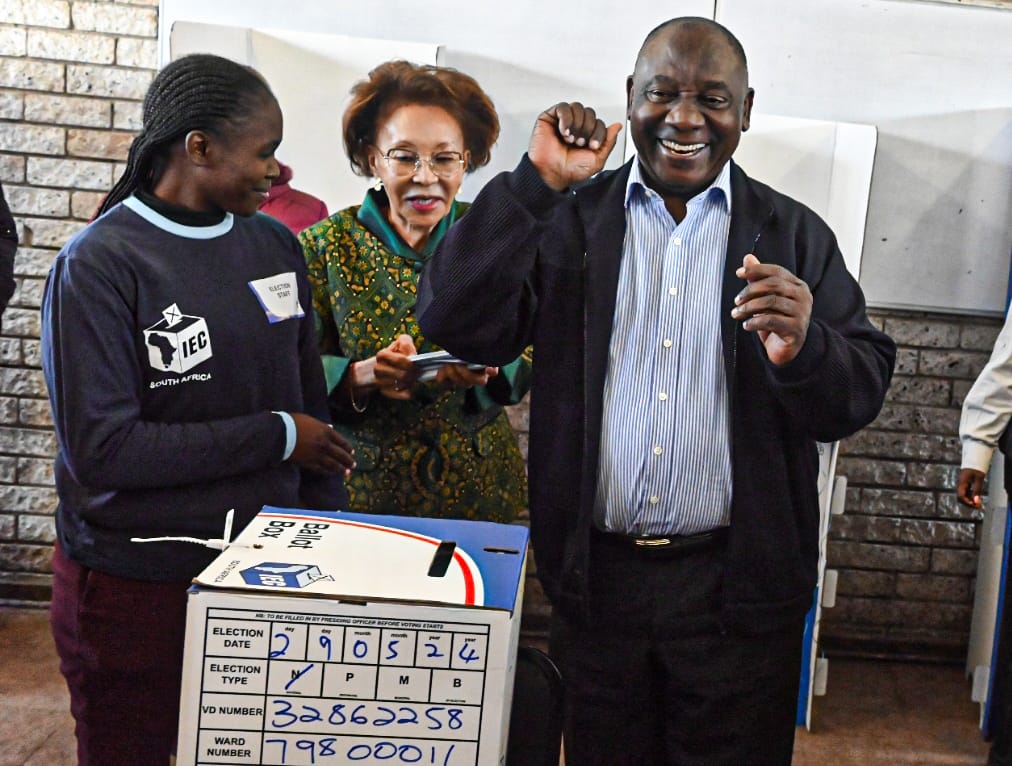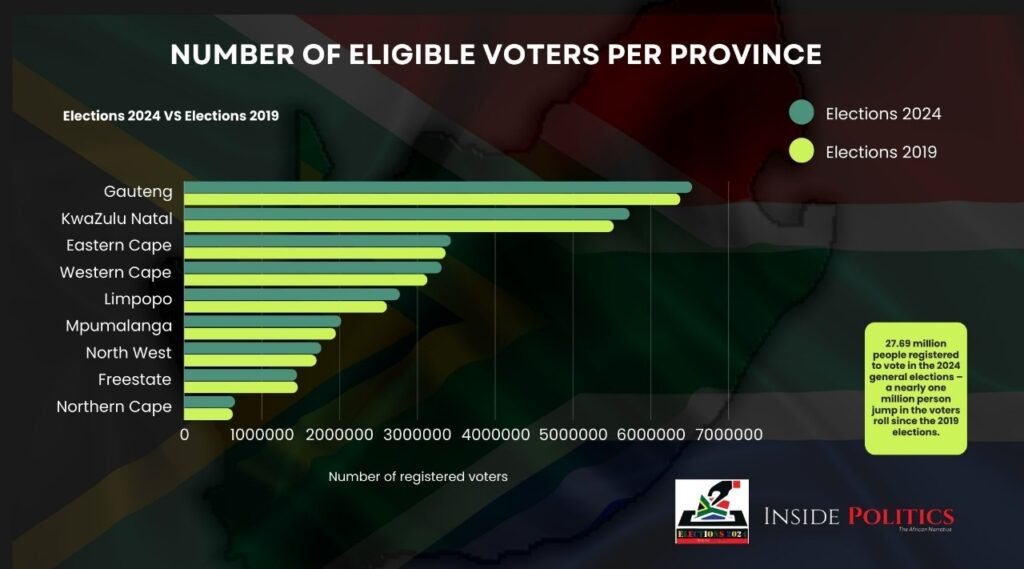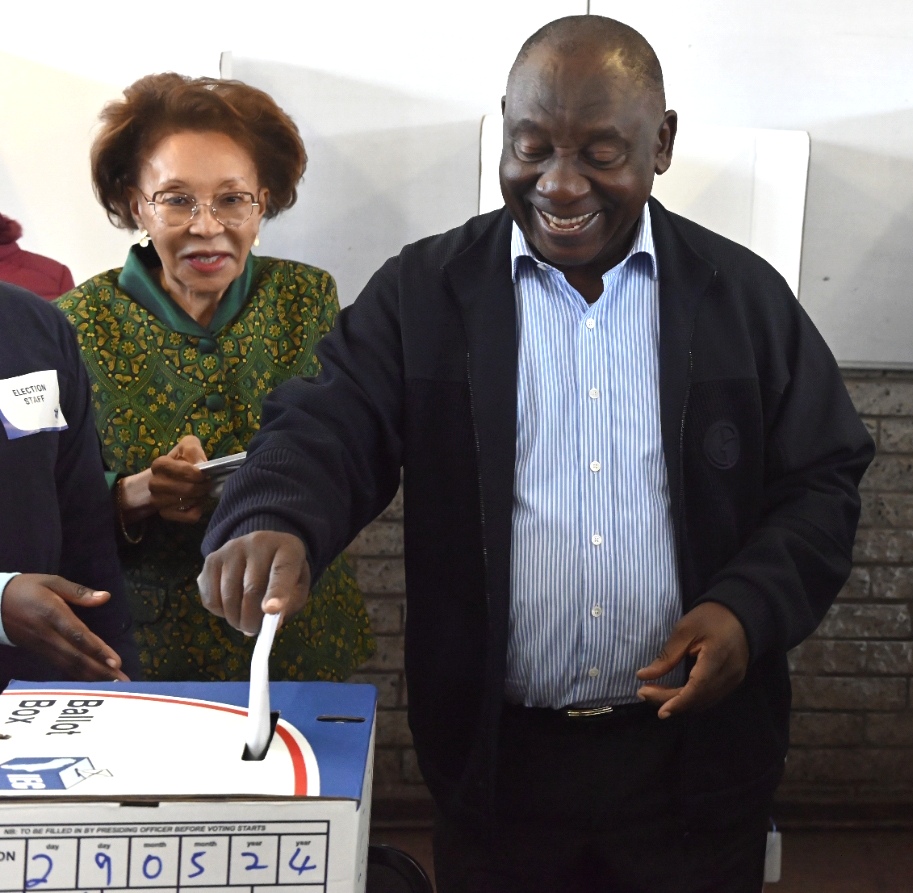Zingisa Mkhuma
Throngs of local and international media waited patiently at Hitekani Primary School in Chiawelo, Soweto hours before South African President Cyril Ramaphosa arrived together with his wife Tshepo Motsepe, flanked by his entourage to cast their ballots in a community where he grew up.
After casting his ballot Ramaphosa went out for an impromptu press briefing where he told the scores of journalists mobbing him that the ANC will win the elections and return him as the President of South Africa.
A smiling Ramaphosa said he had no doubt that the people of South Africa would return the ANC to power and give it another chance to lead.
The high number of journalists from radio, television, digital and print awaiting Ramaphosa’s arrival far outnumbered the number of voters from the community coming in to cast their ballot on Wednesday morning.
The 29 May 2024 National General Elections have become the most important in South Africa’s 30 years of democracy because of the high number of registered voters recorded.

It is also the first time that South Africa experiences such a high number of registered new political parties and independent candidates – all promising to create more jobs and bring an end to poverty and crime among other social ills experienced by the majority of South Africans since the dawn of democracy.
As a result the IEC had to print three ballot papers to accommodate all the political parties, big and small, and all independents candidates across all provinces and nationally.
As Ramaphosa finally walked through the school gates – at exactly 10am – as scheduled, the sea of journalists surged forward and made it impossible to even get a glimpse of him as his bodyguards and volunteers struggled to contain the waves of camera, microphone and cellphone-wielding humans.
At some point Ramaphosa’s spokesperson Vincent Magwenya was waving his hands frantically imploring the journalists to move away from the President. It was such a comical sight to see especially when one of the President’s volunteers whipped up his cellphone and started shooting selfies right in the middle of what resembled a scrum half.

Journalists who are physically challenged in terms of height, had to climb on chairs trying to catch a glimpse or hear a word of what the President was saying in the middle of the noise of clicking cameras, questions from journalists and those jostling to come closer.
One foreign journalist from a Chinese newspaper said the reason for her country’s interest in the elections is that the ANC government has been friends with China since the days of Nelson Mandela. She said her government would be interested in the developments during and after the elections.
An important international observer who came to the Chiawelo voting centre before the arrival of Ramaphosa and also drew the attention of the journalists was former Nigerian President Olusegun Obasanjo.

Obasanjo said the elections were going smoothly and there were no major infringements committed although he described the political contestation as “intense”.
He heaped praises on the IEC for running what he called a very competent ship and said our voting system was one of the best in Africa in terms of infrastructure which made it possible for South Africans in the country and in the diaspora to cast their votes.
“There are more independent candidates and more political parties this time in South Africa. The model here is unique in that there are special votes on Monday and Tuesday and the IEC could send a team to the houses of those who cannot come out to vote. Online registration makes it possible for those in the diaspora to register and cast their votes as well”.
The atmosphere was not so intense at other voting stations as there were no known top political figures who had come to vote.
In Lenasia’s Park Primary School there were a few voters and the IEC workers complained about the network which made the ID scanning machine very slow. However, voters stood patiently in the short queue waiting for their turn to vote.
Eldorado Park was more vibrant and if the activity at the colourful marquees outside Eldorado Park Primary School was a sign of how the community was going to vote, one would say Gayton MaKenzie’s Patriotic Alliance would win the day.
But as one lady wearing a PA T-shirt said when asked if she is voting PA: “I may be wearing a PA T-shirt but the person I am voting for, is in my heart”.
Not everyone was enthusiastic about casting a ballot. An 18-year-old first time voter Nicolene Pagel told Inside Politics that she only came out to vote because her 64-year-old grandmother Celia Pagel who has been voting since 1994, had insisted.
Nicolene was very sceptical about the voting process and kept saying “they will cook up something” on the election results. But her grandmother would have none of her grand-daughter’s negativity and in the end Nicolene went ahead and cast her ballot.
Celia on the other hand said she wanted change as she has been living in her mother’s flat with her children and her grand-children since 1994 in spite of the fact that she had applied for an RDP house more than three decades ago.
“We need some change for the better and I am voting for change,” she quipped.
INSIDE POLITICS

